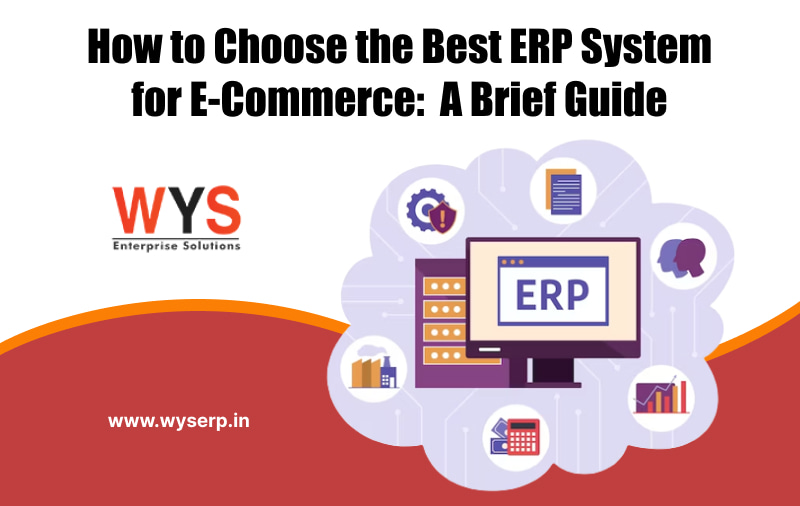In the fast-paced and ever-increasing world of e-commerce, managing multi-channel operations efficiently day-after-day remains crucial for sustained success. Vide this blog, we aim to simplify the process of selecting the best available ERP (Enterprise Resource Planning) system for your e-commerce business irrespective of its size and amplitude. Let’s go right away into understanding the key aspects that make ecommerce great, including the role of ERP in e-commerce and how to choose the right one from the word go.
Understanding the Role of ERP in E-commerce: How and where does an ERP system help us in our business?
1. Streamlining Operations with ERP:
ERP software as a system integrates various business processes into a unified whole while enhancing efficiency and reducing gray areas, loop-holes and repetitions. In the field of e-commerce, given the complete adherence on time and speed of deliveries, an ERP systems plays a very vital role in managing inventory across origins, fulfilling orders by whatever means, and handling and deciphering customer data across multiple channels so that every order is fulfilled to 100% customer satisfaction while leaving room to serve further with newer products and services.
2. Enhanced Visibility and Control:
E-commerce boils down to nothing if visibility is an issue. In a world where visibility is central to sales, a robust ERP system provides real-time insights into operations at every node, be it within the organization or external to it. With the activity being in the nature of a middle-man who needs to be connected with every aspect of business at every moment to understand existing and likely issues for sustained growth, ERP helps gain better control over inventory levels, order processing, financial data, procurement, movements and more thus leading to informed decision-making at every moment. All these, invariably are central to customer service and expectation.
3. Reducing redundancies and loop-holes:
Handing volumes of transactions that most successful ERPs do can bring with it a torrent of problems given the loop-holes that develop with values of business. One of the best ways to cut down redundancies, repetitions and loop-holes is to employ the best ERP for e-commerce that come with predefined structures and business processes, and help streamline things.
How to choose the Best ERP for E-commerce?
1. Choose ERP for E-commerce that remains compatible with Multi-Channel E-commerce Solutions:
Choose the ERP system that seamlessly integrates with your multi-channel ecommerce setup. Anything less with the promise to ramp up things could mean attracting big problems if the promised features do not arrive on time. In particular, look for features in the ERP that support diverse sales channels, such as online stores, marketplaces, and social media platforms.
2. Scalability and Flexibility:
An ERP solution that is good for ONLY small business could be painful where business increases exponentially with the ERP unable to handle volumes and/ or types of business transactions and verticals. It is thus important to select an ERP solution that grows with your business. To this extent, the best ERP solution ought to be cloud-based in order to make it truly scalable and adaptable to increasing data and transaction volumes. Where the best ERP software has this feature, it is sure to provide long-term value including continued growth.
3. A User-Friendly Interface for the best ERP software:
Without a doubt ERP software is a complete ecosystem in itself with suites for every activity of an ecommerce company. It thus makes the system humongous and big, something that can be very daunting for users, including employees. One good way by which an ERP software in India comes up to customer needs is by keeping the interface very intuitive and user-friendly. Not only will it keep operations fast and simple, it would also make training much easier and simpler to adopt and propagate.
4. Customization Options:
E-commerce is a new field that is attracting all manner of business in all manner of ways of sales and promotions. What this demands of the best ERP is that it ought to be very customizable with every aspect from products to modes of sales, as also of deliveries. Any ERP package that allows for tailoring of modes of operations is best suited and most likely to helping in quick growth.
5. Data Security and Compliance:
If there is one thing in the e-commerce sphere that’s more important than everything else, it is Data! Be it of customer needs, prices, volumes, places and so on, it’s what keeps business going with the ability to know and predict customer needs. Now imagine if it was lost or pilfered! It would mean the end of the e-commerce venture! No e-commerce company can ever afford such an eventuality making data protection and compliance its main concern- something best addressed by the best ERP software package. While looking into the aspect of data security, one ought to look into issues including data encryption to ensure data even if lost, ought never to enter the wrong hands.
6. Cost-Effectiveness:
While a good ERP software can get you higher sales, its expense can be its biggest deterrent! What if it cost a big fraction of your sales and turnover? What then? It’s then that you ought to think of the costs involved in buying the best ERP package in order to see if it makes sense buying it. If it doesn’t, it could be time to move on. One effective way to cut down costs is to go on the cloud!
Conclusion:
Selecting the right ERP system for your e-commerce business is a pivotal decision. The chosen ERP should seamlessly integrate with multi-channel ecommerce solutions, provide scalability, and offer a user-friendly interface. Researching e-commerce software providers, ensuring customization options, prioritizing data security, and considering the cost-effectiveness of the solution are all critical factors.
